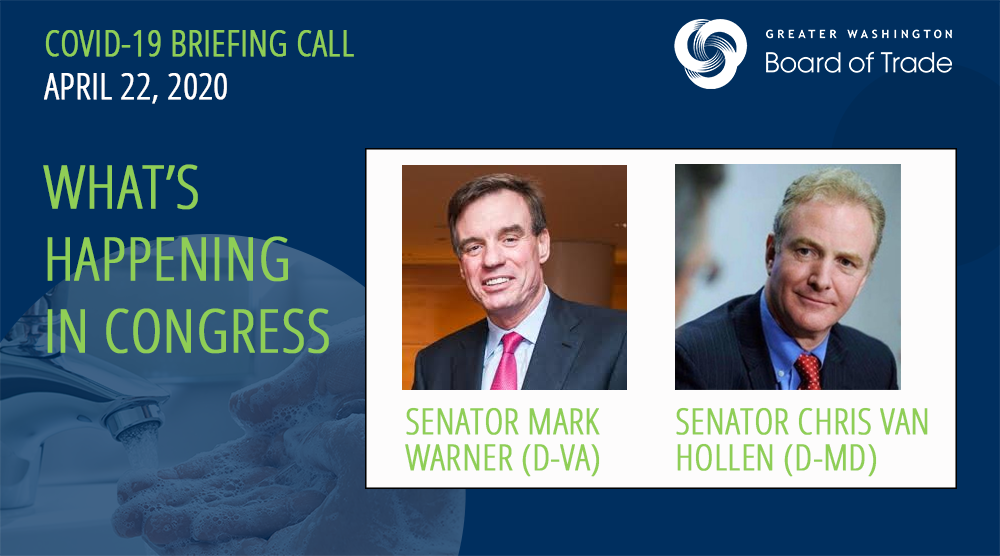COVID-19 Briefing: What’s Happening in Congress
On April 22, Senators Mark Warner (D-VA) and Chris Van Hollen (D-MD) graciously spent an hour online with Board of Trade members and friends to discuss Congress’s work to lead the country through the COVID-19 pandemic and ensuing economic crisis. Below is a summary of the key points they each made.
Note: This briefing call was not recorded.

Discussion Summary
On a nation-wide testing regime:
The Senators agreed that in order to reopen our economy, we need a robust testing system. This includes diagnostic testing to diagnose sick people, surveillance testing that also tests people who are not showing symptoms to gauge the rate of virus transmission in a population, and antibody testing to identify people who have recovered from the virus and may be immune.
Through widespread and ample testing, we can safely begin to reopen our economy and allow schools and businesses to reopen. The CDC and the White House have advised that communities observe a two-week decline in cases before relaxing restrictions. Senator Warner noted that as a former Governor, he is alarmed to see some Governors of other states, such as Georgia, begin relaxing restrictions before this criterion is met.
Senator Van Hollen noted that most information he has seen on Maryland and the National Capital Region indicates we will not experience our peak of the virus until mid-May.
The Senators argued that the United States has not been testing nearly enough citizens and that we are behind other industrialized countries. Senator Van Hollen stressed that we should be conducting half a million tests per day nationally in order to return to normalcy, citing experts. (To date, the United States has tested nearly 4.5 million people.)
The Senators explained that this is a supply chain problem. COVID-19 tests require supplies such as swabs, reagents, and transport kits, and they need to be processed in a lab. Even when there is lab capacity, there are not always enough supplies to increase testing. The Senators explained that they asked for $25 billion to be included in this week’s legislation (which they call bill 3.5) to invest in the testing supply chain.
The Senators also argued that we need a centralized, national testing regime because requiring states to procure their own supplies puts them in competition with each other and drives up prices of supplies. Both Senators also posited that the need for widespread testing and contact tracing could be an opportunity to deploy our AmeriCorps and Peace Corps volunteers.
On the Paycheck Protection Program (PPP) and other measures to help small businesses:
Senator Van Hollen acknowledged that it was very predictable that the PPP fund would run out of money quickly. Senator Warner noted that there were 1.7 million grants given out, but there are 11 million firms with under 500 employees in the United States.
The Senators discussed ways to improve this program. In the bill that passed in the Senate on Tuesday and is likely to pass in the House today, another $310 billion will be allocated to the PPP. This time, more of the funds will flow through smaller lenders, said Senator Van Hollen. The intention is to make sure the money gets to more “mom and pop” shops rather than large, publicly traded companies.
Both Senators agreed that Treasury Secretary Steve Mnuchin was a good negotiating partner, but they disagreed with two restrictions that the Treasury placed on small businesses when using the PPP funds. First, they disagreed with the cap that was placed on what could be spent on fixed costs and later forgiven, claiming that this did not reflect the needs of small business owners. Second, they voiced serious concern with the Treasury’s requirement that the PPP funds be spent within eight weeks. The Senators believe that this will incentivize businesses to hire back workers before they can be put back to work, and then let them go again in eight weeks should business still be at a stand-still. They believe that small businesses should have the flexibility to use these funds when they are preparing to ramp up again. In the meantime, the more generous unemployment insurance was meant to help workers.
Senator Mark Warner is currently advocating for a completely different approach, which is to provide direct grants to small businesses to cover their payroll costs, without using banks as intermediaries. He argues that this may be a smarter way to structure assistance in a phase four bill.
Senator Van Hollen advised small businesses to apply for both PPP and the SBA’s Economic Injury Disaster Loans (EIDL) for now. They are not meant to be mutually exclusive. If you receive the EIDL and the $10,000 grant that comes with it and then later receive a PPP loan, $10,000 is simply deducted from the amount that is forgiven in the PPP loan. If you applied for a PPP loan or EIDL and have not yet received one because the money ran out, check with your lender for the PPP loan and the SBA for the EIDL to see if you need to refresh or renew your application.
On funding for states and the District:
The Senators said they were unable to get additional funding for state and local governments and the District in this week’s “3.5” bill, but that the President has agreed that this will be included in the phase four bill. Senator Van Hollen voiced a commitment to dealing with DC’s $700 million shortchange retroactively and on a forward basis. He said that many Republican senators are willing to work with them on this.
Warner also raised concern over a provision in the last bill that prohibits state and local governments from using relief money to supplement revenue loss. Hospitals and companies can use the relief funds to supplant revenue loss, but states cannot. Warner is concerned that this will impact first responders and other critical municipal services and noted that Hogan has raised the same concern.
On reopening the economy:
The Senators stressed that the first priority is establishing a national, robust testing regime. They also noted that as restrictions are relaxed, many decisions will need to be made about how to protect employees and consumers. Employers and lawmakers should be thinking through those requirements now. Senator Warner said he hopes to see a regional approach to reopening, noting that Virginia is a large state with different circumstances in the southern counties compared to the D.C. suburbs. Senator Van Hollen commended a regional approach to COVID-19 and noted that he was pleased to see leaders working together and listening to healthcare experts.
Become a member today
We need your voice at the table to make Greater Washington a place where everyone can succeed



















